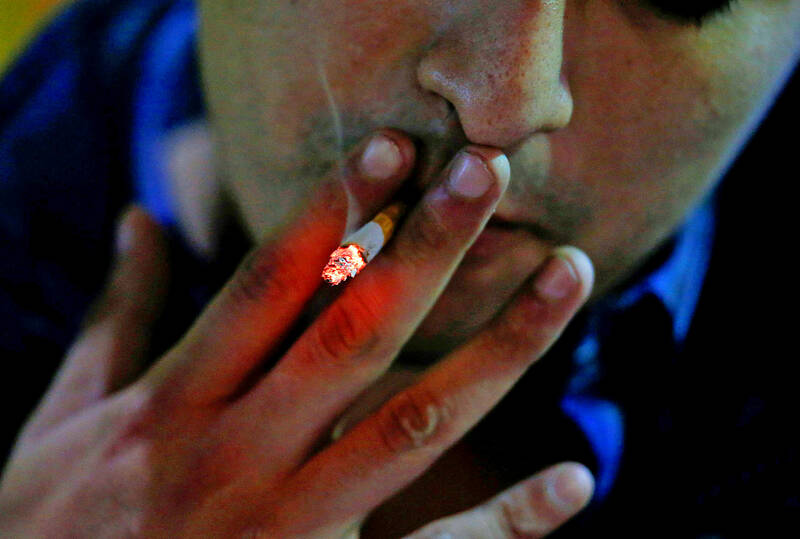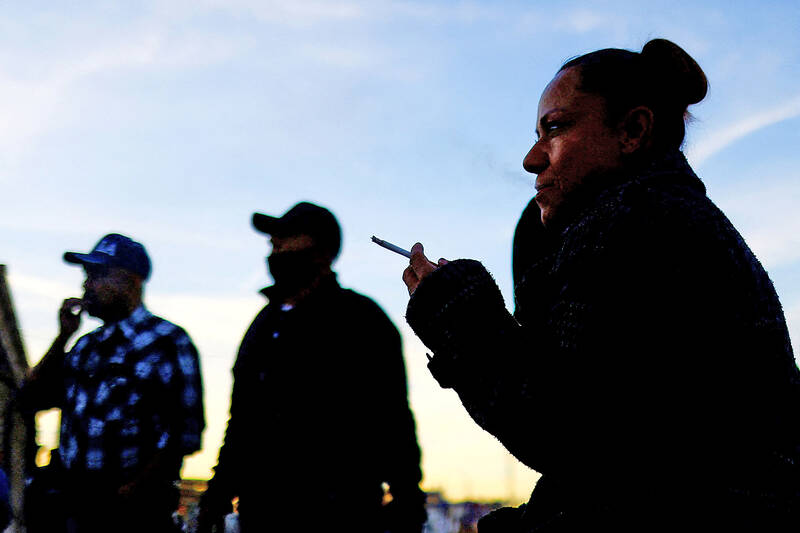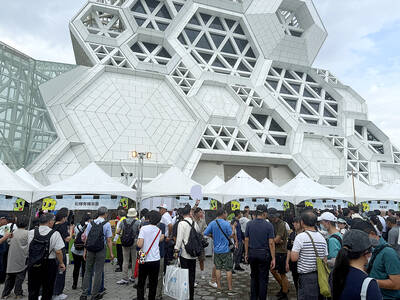Stopping smoking at any age helps to reduce the risk of cancer, according to a major study, which found the most substantial drop in cancer risk came after the first decade of stubbing out.
The chances of developing cancer halved in people who quit for at least 15 years, compared with those who continued to smoke, with the risk from lung cancer falling further and faster, particularly in those who quit before middle age.
Researchers analyzed medical data from nearly 3 million Koreans who had health examinations from 2002 onwards and recorded cases of cancer, including lung, liver, stomach and colorectal tumors until 2019. Over the course of the study, nearly 200,000 participants received a cancer diagnosis.

Photo: Reuters
“Regardless of age, quitting smoking has been shown to reduce the risk of developing cancer, especially lung cancer, with early cessation before middle age leading to significant reductions,” said
Oh Jin-kyoung, who led the study at the National Cancer Center near Seoul.
After an average follow-up of 13 years and five months, the risk of lung cancer among quitters fell 42 percent, with smaller falls of 27 percent, 20 percent and 14 percent recorded for liver, colorectal and stomach cancers respectively, compared with those who continued smoking. Details were published in Jama Network Open.

Photo: Reuters
Cancer causes more than a quarter of all deaths in the UK each year, with lung cancer by far the most common. Smoking causes at least 15 different cancers, affecting the lungs, bladder, stomach and bowels and organs, such as the kidneys and liver. Tobacco is the largest preventable cause of cancer and death in the country.
According to the study, smokers who quit before the age of 50 had their risk of lung cancer fall 57 percent over the follow-up period compared with those who continued to puff. Those who quit at 50 or older experienced a 40 percent reduction in lung cancer risk over that time.
“Quitting smoking, no matter your age, can have significant health benefits,” Oh said. “Individuals who quit smoking after middle age had a 40 percent lower risk of developing lung cancer compared to those who continued smoking. Don’t think it’s too late. We encourage you to consider starting your journey to quit smoking.”
The development of cancer is a multi-stage process, with DNA mutations mounting up until one or more cells are damaged in a way that leads them to replicate uncontrollably, said Robert West, professor emeritus of health psychology at University College London and an expert on addiction. The further the smoker is along that pathway when they stop, the greater the chance they will end up developing cancer.
“This study confirms two crucial facts,” West said. “One is that it can take many years for the risk of cancer to decrease relative to continuing smoking. The other is that the decrease is greater for those who quit at a younger age.”
“For smokers, this shows how crucial it is to stop smoking as young as possible. There is a benefit at every age but, the younger smokers can stop, the more of their lives they get back,” West added. “The way out of smoking is clear: try to stop at least once a year and make use of evidence-based specialist stop-smoking support at every quit attempt rather than trying to go cold turkey.”
Malcolm Clark, senior prevention policy manager at Cancer Research UK, said that smoking remains the leading cause of cancer, causing around 150 cases across the UK every single day — and the majority of people who smoke have tried to quit.
“It’s never too late to stop smoking, but people need support to help them quit. That’s why we support the UK government’s increased funding for stop-smoking services and the upcoming legislation to change the age of sale of tobacco. If implemented, this could help stop the next generation ever becoming addicted to tobacco.”

Water management is one of the most powerful forces shaping modern Taiwan’s landscapes and politics. Many of Taiwan’s township and county boundaries are defined by watersheds. The current course of the mighty Jhuoshuei River (濁水溪) was largely established by Japanese embankment building during the 1918-1923 period. Taoyuan is dotted with ponds constructed by settlers from China during the Qing period. Countless local civic actions have been driven by opposition to water projects. Last week something like 2,600mm of rain fell on southern Taiwan in seven days, peaking at over 2,800mm in Duona (多納) in Kaohsiung’s Maolin District (茂林), according to

Aug. 11 to Aug. 17 Those who never heard of architect Hsiu Tse-lan (修澤蘭) must have seen her work — on the reverse of the NT$100 bill is the Yangmingshan Zhongshan Hall (陽明山中山樓). Then-president Chiang Kai-shek (蔣介石) reportedly hand-picked her for the job and gave her just 13 months to complete it in time for the centennial of Republic of China founder Sun Yat-sen’s birth on Nov. 12, 1966. Another landmark project is Garden City (花園新城) in New Taipei City’s Sindian District (新店) — Taiwan’s first mountainside planned community, which Hsiu initiated in 1968. She was involved in every stage, from selecting

The latest edition of the Japan-Taiwan Fruit Festival took place in Kaohsiung on July 26 and 27. During the weekend, the dockside in front of the iconic Music Center was full of food stalls, and a stage welcomed performers. After the French-themed festival earlier in the summer, this is another example of Kaohsiung’s efforts to make the city more international. The event was originally initiated by the Japan-Taiwan Exchange Association in 2022. The goal was “to commemorate [the association’s] 50th anniversary and further strengthen the longstanding friendship between Japan and Taiwan,” says Kaohsiung Director-General of International Affairs Chang Yen-ching (張硯卿). “The first two editions

It was Christmas Eve 2024 and 19-year-old Chloe Cheung was lying in bed at home in Leeds when she found out the Chinese authorities had put a bounty on her head. As she scrolled through Instagram looking at festive songs, a stream of messages from old school friends started coming into her phone. Look at the news, they told her. Media outlets across east Asia were reporting that Cheung, who had just finished her A-levels, had been declared a threat to national security by officials in Hong Kong. There was an offer of HK$1m (NT$3.81 million) to anyone who could assist